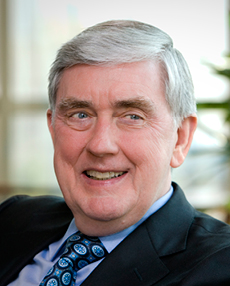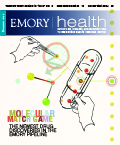1,000,000 more birthdays

John Seffrin, CEO of the American Cancer Society, ponders how to save millions of lives around the globe.
There has perhaps never been a more exciting—or challenging—time to be involved in the fight against cancer.
Despite the fact that according to recent World Health Organization projections, cancer will have replaced ischemic heart disease as the overall leading cause of death worldwide in 2010, our understanding of cancer and what to do about it is unprecedented. We know more today than ever before about how to battle cancer. The 11 million Americans alive today who have survived the disease are living proof of our progress, as are age-adjusted cancer death rates in the United States, which have declined for at least 15 successive years.
Looking back over the nearly 100-year history of the American Cancer Society, or even just in my lifetime, we have come so far in our understanding of cancer. When the Society was founded in 1913, cancer was an almost certain death sentence. Today, the hopeful side of the disease has never been so hopeful. Most people survive.
Fifteen years ago, the Society set aggressive goals for the year 2015, to measurably reduce the impact of cancer, decreasing cancer mortality by 50%, reducing cancer incidence by 25%, and improving quality of life for people with the disease. We still have a long way to go to meet those goals, but we have come far down the path. How? By redoubling our efforts to research the causes and cures of cancer. By promoting and elevating prevention into standard practice nationwide. And by ensuring access to quality health care for all Americans—a giant step taken by our nation last year.
In total, by my calculations, these goals for 2015 have helped avoid 767,000 cancer deaths in the United States. Another way to think of that number is that we’ve saved more than 350 lives per day that otherwise would have been lost to cancer.
Looking forward, the future holds the promise of an even greater ability to control cancer, thanks to our ever-increasing experience and expanding knowledge from evidence-based research. In fact, I believe, and evidence strongly suggests, that cancer is potentially the most preventable and most curable of the major life-threatening chronic diseases facing humankind. It is what we now do with our knowledge about cancer that matters.
|
John Seffrin’s first encounter with cancer was when his grandmother died when he was 10. He has since lost his mother to cancer, and his wife, Carole, is a breast cancer survivor. |
Global impacts
Although we have been making progress in the United States against this disease, the cancer fight around the globe tells a different story. Both in terms of lives and dollars lost, cancer’s threat to global health has never been greater. Unless there is change, cancer will be the disease of the 21st century, simply because of a lack of intervention with what we already know how to do.
Noncommunicable diseases as a whole—including cancer, cardiovascular disease, diabetes, and respiratory disease—account for more than 60% of deaths worldwide, and yet less than 3% of all public and private developmental funding for health is spent on these diseases, according to the Center for Global Development. A 2010 Society and Livestrong report showed for the first time that cancer also causes more economic harm than any other cause of death worldwide, and just two noncommunicable diseases—cancer and heart disease—account for $1.6 trillion in lost productivity every year. Noncommunicable diseases are simply not a current global priority and are absent as a topic from the United Nation’s Millennium Development Goals (a key driver behind global health funding), G8 and G20 meetings, and funding allocations by major governments.
To the Society, the burgeoning cancer challenge presents an incredible opportunity to transform global health, to save thousands more lives every day around the world. We’re not satisfied with saving 350 lives each day in our own country when we know we can achieve more and when the world at large is facing a growing cancer pandemic.
At the American Cancer Society, we’ve begun a transformation of our organization to help bring cancer under control as early as possible in the 21st century. In the process, we believe we can help move the cancer dial exponentially—from saving 350 lives per day to 1,000 per day in the United States and potentially 10,000 per day worldwide.
That is not an easy goal, but it’s one we have the knowledge to achieve, if collectively we put the right resources behind it. I believe it is not only the right thing to strive toward. It is our moral imperative to do so. If we do not, we choose to ignore millions of avoidable deaths from cancer and a needless economic burden.
What will it take?
This major public health education challenge will require strong collaboration among all sectors—private, nonprofit, and government—to be successful. The quickest way to achieve that goal is to
- Prevent the cancers that are preventable
- Treat the cancers that are treatable
- Fix the fixable in our health care systems
- Provide state-of-the-art and dignified health care for all people facing cancer.
If we can build a collaborative approach to global health that can accomplish these four goals, I believe we can move that cancer dial by leaps and bounds. Our lifesaving results thus far are proof that we can indeed make significant progress against this disease.
Applying these four approaches worldwide will take a concerted effort on many levels to transform global health, beginning with a successful United Nations high-level meeting on noncommunicable diseases in September 2011. This meeting marks an important paradigm shift in the global health community that acknowledges the need for the prominence of noncommunicable diseases on the world stage. It is vital that this UN meeting is a success, that leaders around the world and in our own nation recognize that cancer and all noncommunicable diseases are more than health issues alone. They are also economic and development issues, with ripple effects throughout all levels of society.
We must dedicate more resources and energy to cancer research worldwide as well as to strong and effective public health education campaigns. Through awareness campaigns, community-based interventions, and aggressive advocacy for better public policy, we can pursue a true systems change, transforming and balancing the world’s health agenda. If we can do this, making cancer a true global health priority, we have the potential to strengthen health systems, bolster economies worldwide, move entire regions out of poverty, and save millions of lives.
At the Society, we would call that creating millions of more birthdays. I believe millions of more birthdays on a planetary scale is possible in this century—if we work together on what we already know that we need to do.—John Seffrin
|
Web Connection: The American Cancer Society is a valued partner of Emory, and Seffrin is a member of this magazine’s editorial advisory board. To learn more about the Society’s life-saving programs, visit cancer.org. |
||||



